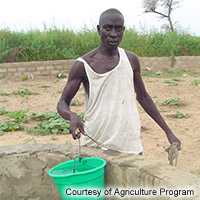Agriculture Program

Project Information
Assisting farmers in improving yield and to become economically self-sufficient.
Describe the need affecting community
How will this Advance project help to address the need?
The project has been addressing this need by gathering farmers into groups based on closeness of villages, and teaches them about sustainable agriculture. Also to set a demonstration plot for practices and granting them some loan, which is very important for them to get started. Many local farmers still need some assistance, technically and financially. Thus, the project really needs to grow by having enough resources which will enable it to assist as many needy farmers.
Describe the primary goal of the project
To improve the yield of small scale village farmers and establish agricultural projects for local United Methodist Churches which will be generating some funds to enable these local churches to be self-sufficient.
Describe the change you would like to see in the community as a result of this Advance project
To see small scale village understand and master the concept of sustainable agriculture by doing it. The see the yield of small scale village farmers reach an acceptable yield of different major crops from different areas. Also to see an ongoing agricultural project from every local United Methodist Church mostly in rural areas.

